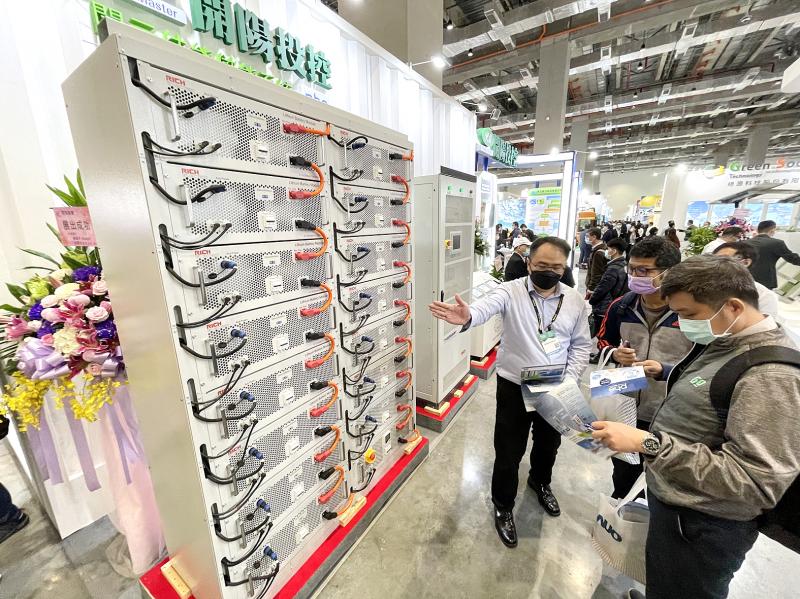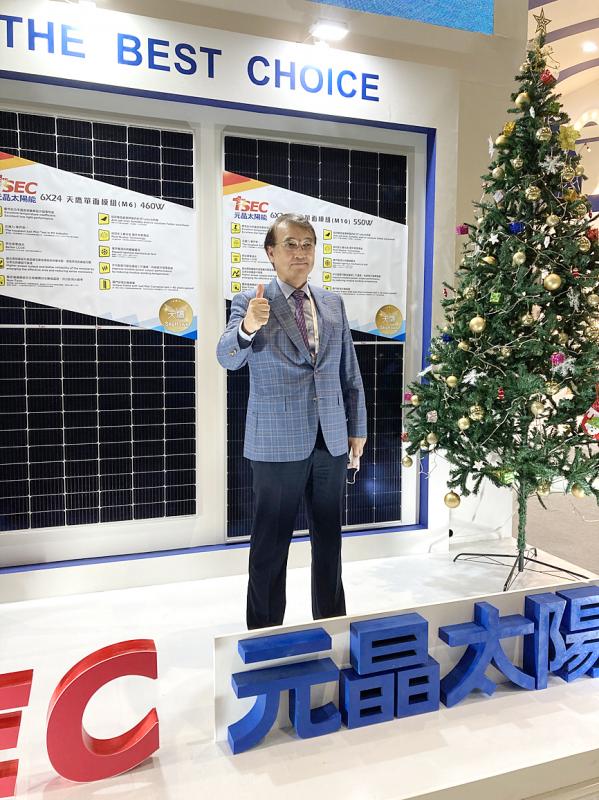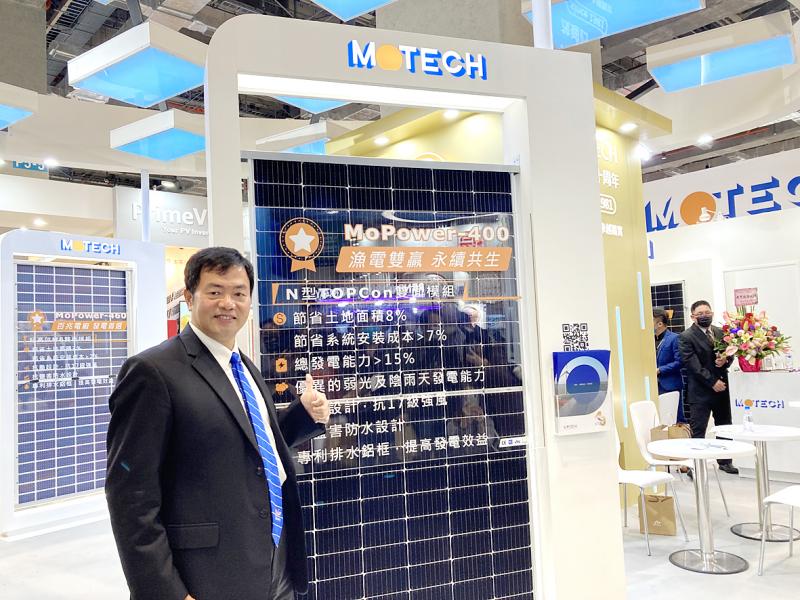Solar cell and module supplier TSEC Corp (元晶) yesterday gave a robust outlook for this quarter, with an order backlog that would take at least two quarters to digest.
The company, based in New Taipei City’s Sindian District (新店), said it has started taking orders for delivery in the third quarter of next year, as its production lines are fully booked.
This should help TSEC swing back to the black this quarter and help offset losses of NT$198.69 million (US$7.16 million) in the first three quarters, company spokesman Henry Chiang (江郅豪) told a media briefing in Taipei.

Photo: CNA
“Both shipments and prices are on the rise in the fourth quarter. We have a chance to eke out a profit for the full year,” Chiang said. “Revenue this month should remain at the same high level as that of November.”
TSEC expects the improvement in profitability to extend into next year, thanks to falling raw material costs and a surge in solar module demand in the domestic market.
The company expects solar panel installations in the nation to climb to more than 11 gigawatts (GW) next year, suggesting an increase of more than 3GW.

Photo: Lisa Wang, Taipei Times
“There is a lot of catch-up to do next year, as installations this year have been slow due to the COVID-19 outbreak and raw material shortages,” Chiang said.
By the end of this year, Taiwan’s solar energy installation is estimated to reach 7GW, less than half of the government’s 20GW target by 2025.
To satisfy customer demand next year, TSEC is investing NT$1 billion to build a new solar cell line and solar module line next year to make larger solar modules, Chiang said.

Photo: Lisa Wang, Taipei Times
That would increase its solar cell and module capacity to 1.5GW next year from 1GW this year, after new M6 (166mm2) and M10 (182mm2) solar cells enter production next year, he said.
Solar cell and module maker Motech Industries Inc (茂迪) shared TSEC’s optimistic view.
“There will be explosive growth in the first and second quarters next year. The momentum would to carry into the second half,” Motech president Fred Yeh (葉正賢) told reporters on the sidelines of the annual Energy Taiwan trade show in Taipei.
“Customers have to wait for six months to receive their products,” Yeh said.
The company plans to roll out new-generation tunnel oxide passivated contact (TOPCon) cells that can produce more solar power in the third quarter next year, after current-generation TOPCon gains traction.
Motech, based in Tainan, plans to expand its TOPCon solar cell capacity to 200 megawatts (MW) next year, up from 15MW this year.

MULTIFACETED: A task force has analyzed possible scenarios and created responses to assist domestic industries in dealing with US tariffs, the economics minister said The Executive Yuan is tomorrow to announce countermeasures to US President Donald Trump’s planned reciprocal tariffs, although the details of the plan would not be made public until Monday next week, Minister of Economic Affairs J.W. Kuo (郭智輝) said yesterday. The Cabinet established an economic and trade task force in November last year to deal with US trade and tariff related issues, Kuo told reporters outside the legislature in Taipei. The task force has been analyzing and evaluating all kinds of scenarios to identify suitable responses and determine how best to assist domestic industries in managing the effects of Trump’s tariffs, he

TIGHT-LIPPED: UMC said it had no merger plans at the moment, after Nikkei Asia reported that the firm and GlobalFoundries were considering restarting merger talks United Microelectronics Corp (UMC, 聯電), the world’s No. 4 contract chipmaker, yesterday launched a new US$5 billion 12-inch chip factory in Singapore as part of its latest effort to diversify its manufacturing footprint amid growing geopolitical risks. The new factory, adjacent to UMC’s existing Singapore fab in the Pasir Res Wafer Fab Park, is scheduled to enter volume production next year, utilizing mature 22-nanometer and 28-nanometer process technologies, UMC said in a statement. The company plans to invest US$5 billion during the first phase of the new fab, which would have an installed capacity of 30,000 12-inch wafers per month, it said. The

Taiwan’s official purchasing managers’ index (PMI) last month rose 0.2 percentage points to 54.2, in a second consecutive month of expansion, thanks to front-loading demand intended to avoid potential US tariff hikes, the Chung-Hua Institution for Economic Research (CIER, 中華經濟研究院) said yesterday. While short-term demand appeared robust, uncertainties rose due to US President Donald Trump’s unpredictable trade policy, CIER president Lien Hsien-ming (連賢明) told a news conference in Taipei. Taiwan’s economy this year would be characterized by high-level fluctuations and the volatility would be wilder than most expect, Lien said Demand for electronics, particularly semiconductors, continues to benefit from US technology giants’ effort

‘SWASTICAR’: Tesla CEO Elon Musk’s close association with Donald Trump has prompted opponents to brand him a ‘Nazi’ and resulted in a dramatic drop in sales Demonstrators descended on Tesla Inc dealerships across the US, and in Europe and Canada on Saturday to protest company chief Elon Musk, who has amassed extraordinary power as a top adviser to US President Donald Trump. Waving signs with messages such as “Musk is stealing our money” and “Reclaim our country,” the protests largely took place peacefully following fiery episodes of vandalism on Tesla vehicles, dealerships and other facilities in recent weeks that US officials have denounced as terrorism. Hundreds rallied on Saturday outside the Tesla dealership in Manhattan. Some blasted Musk, the world’s richest man, while others demanded the shuttering of his